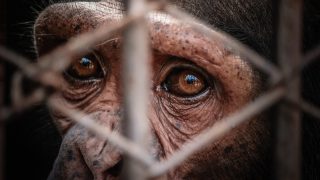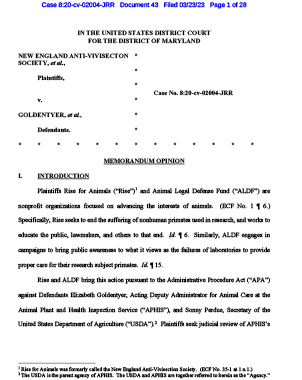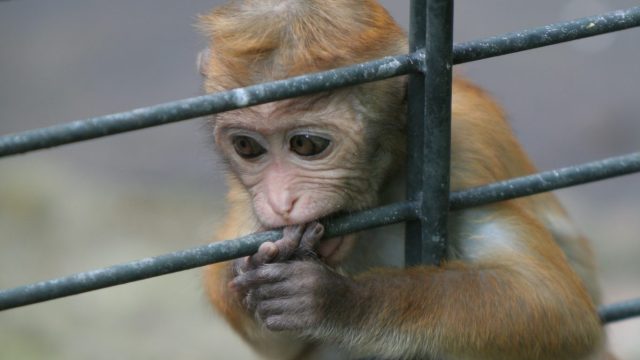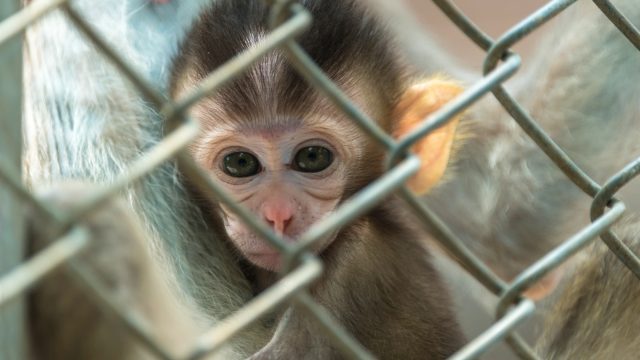
Federal Judge Rules USDA Acted Unlawfully in Denying Petition to Improve the Psychological Well-Being of Primates Used in Research
The case will now go back to the agency to reconsider its decision
WASHINGTON, D.C. — On March 23, 2023, Judge Julie Rubin of the federal district court in Maryland issued a stunning victory for Harvard Law School’s Animal Law & Policy Clinic.
In her 28-page decision, Judge Rubin ruled that the United States Department of Agriculture (USDA) acted unlawfully by denying a petition for rulemaking to improve the standard for the psychological well-being of primates used in research. The original Petition was submitted by the Clinic’s clients’ the Animal Legal Defense Fund and Rise for Animals.

March 23, 2023 opinion – Judge Rubin
“It is long overdue for the USDA to establish clear and enforceable standards that prioritize the psychological well-being of primates, rather than simply rubber stamp industry-created enrichment plans that do not adequately address the unique needs of these sensitive beings,” said Animal Legal Defense Fund Managing Attorney Christopher Berry.
In its ruling, the Court zeroed in on the fact that the agency’s principal explanation for denying the Petition to upgrade the 1991 standard was the claim that the USDA already inspects “all of the animals” every year to ensure each facility is operating in compliance with its “enrichment plan” for the psychological well-being of the primates. Pointing to an “internal” document obtained by the Clinic under the Freedom of Information Act, the Court noted this hasn’t been true since 2019, when without telling the public the USDA instituted a new inspection policy under which the agency actually prohibits its inspectors from conducting full inspections of any research facility accredited by the Association for Assessment and Accreditation of Laboratory Animal Care (AAALAC) – a private industry organization. Judge Rubin ruled that in light of this revelation, the agency’s decision to deny the rulemaking petition was unlawful not only because it “failed to provide a full explanation for its reasoning,” but because the agency based its decision “on facts known by it to be false.”
Judge Rubin also ruled that the denial of the petition for rulemaking was unlawful because the agency failed to respond to any of the more than 10,000 comments it received – the vast majority of which urged the agency to grant the Petition. After noting that “the Agency has before it thousands of scientific community (and other) comments describing the suffering of … nonhuman primates in research facilities,” the Court decried the agency’s failure to respond to a single comment, stating that: “Given the throngs of scientific community members’ interest in the Subject and considerable, apparently serious-minded contributions from the relevant scientific community, it strains credulity that none of the 10,137 comments warranted even the barest consideration.”
For these and other reasons, the Court held that the agency’s denial of the petition was unlawful and ordered the case back to the agency to reconsider its decision.
Sign Up!
Join the Animal Legal Defense Fund's email list to stay up to date on lawsuits, legislation, and regulations affecting animals.
Focus Area
How We Work
Related
-
CDC Seeks to End Program Using Monkeys in Research
The Animal Legal Defense Fund continues to advocate for animals suffering in research labsDecember 8, 2025 News -
Washington Governor Signs Animal Protection Bills into Law
The four laws will offer better protections for companion animals and keep wild animals from being exploited for entertainment in the stateMay 16, 2025 News -
Evidence Shows University of Wisconsin-Madison Illegally Censors Critics of Animal Testing
Animal Legal Defense Fund files motion for summary judgement with damning evidence against the universityMay 19, 2022 Press Release




